
This is a list of notable hors d'oeuvre, also referred to as appetizers or starters, which may be served either hot or cold. They are food items served before the main courses of a meal, and are also sometimes served at the dinner table as a part of a meal. Many cultures serve dips, such as baba ghanoush, chili con queso, hummus, and tzatziki with bread or vegetables as hors d'oeuvre.
If the period between when guests arrive and when the meal is eaten (for example during a cocktail hour) is extended these might also serve the purpose of sustaining guests during the wait, in the same way that apéritifs are served as a drink before meals. Hors d'oeuvre are sometimes served with no meal afterward; this is the case with many reception and cocktail party events.
Hors d'oeuvre
| Name | Image | Origin | Description |
|---|---|---|---|
| Angels on horseback |  |
England | Oysters wrapped in bacon, served hot: In the United Kingdom, they can also be a savoury, the final course of a traditional British formal meal. They are somewhat similar to devils on horseback and the Midwestern version of pigs in a blanket, a traditional dish of the American Midwest. |
| Antipasto | 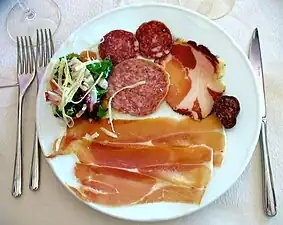 |
Italy | The traditional first course of a formal Italian meal: Traditional antipasto includes cured meats, olives, peperoncini, mushrooms, anchovies, artichoke hearts, various cheeses (such as provolone or mozzarella), and pickled meats and vegetables (both in oil or in vinegar). |
| Arab salad | 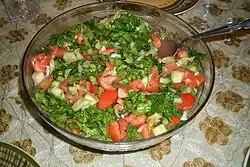 |
Middle East | Any of a variety of salad dishes that form part of Arab cuisine |
| Bakwan |  |
Indonesia | A vegetable fritter snack—fried meal consisting of vegetables and batter. The ingredients are vegetables; usually beansprouts, shredded cabbages and carrots, battered and deep fried in cooking oil |
| Batagor |  |
Indonesia | A traditional dumpling consisting of fried fish dumplings, usually served with peanut sauce. This appetizer usually served with fried tofu and finger-shaped fried otak-otak fish cakes. |
| Batata vada |  |
India | A popular Indian vegetarian fast food in Maharashtra, India, it literally means "potato fritters". The Marathi word batata means potato in English. It consists of a potato mash patty coated with chick pea flour, then deep-fried and served hot with savory condiments called chutney. The vada is a disc, around 2 to 3 inches (5.1 to 7.6 cm) in diameter. |
| Barbajuan |  |
Monaco | An appetizer mainly found in the eastern part of French Riviera and Northern Italy, a barbajuan is a fritter filled with Swiss chard, spinach, and ricotta cheese, among other ingredients. |
| Blooming onion |  |
United States | Typically, this consists of one large onion which is cut to resemble a flower, then battered and deep-fried. It is served as an appetizer at some restaurants. |
| Bruschetta |  |
Italy | An Italian antipasto, its origin dates to at least the 15th century. It consists of grilled bread rubbed with garlic and topped with olive oil, salt, and pepper. It is often topped with tomato. |
| Buffalo wing |  |
United States | A chicken wing section (wingette or drumette) that is generally deep-fried, unbreaded, and coated in a sauce of vinegar-based cayenne pepper, hot sauce, and butter in the kitchen.[1] |
| Canapé |  |
France | A small, prepared and usually decorative food, held in the fingers and often eaten in one bite |
| Carpaccio |  |
Italy | Raw meat (such as beef, veal, venison, salmon, or tuna), thinly sliced or pounded thin, and served mainly as an appetizer: Pictured is carpaccio with cheese. |
| Caviar |  |
Iran, Russia | Traditionally, it refers to roe from wild sturgeon in the Caspian and Black Seas.[2] |
| Charcuterie board | .jpg.webp) |
North America | An assortment of charcuterie (cured meats), and complementary cheeses, fruits, vegetables, nuts, and spreads arranged on a wooden board or stone slab |
| Cheese and crackers |  |
United Kingdom, North America | Various cheeses and crackers paired together, typically served at parties or gatherings |
| Chicken fingers | 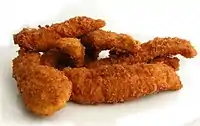 |
United States | Chicken fingers are prepared by dipping chicken meat in a breading mixture and then deep-frying them. They are typically served with sauce, which can be ketchup, ranch, barbecue or a honey mustard. [3] In North America, they are usually prepared from the breast muscles of chicken.[4] |
| Chicken lollipop |  |
Indo-Chinese | An hors d'œuvre made from the drummette segments of chicken wings or from drumsticks. The flesh on the segments is pushed to one end of the bone. |
| Crab puff | .jpg.webp) |
United States | Balls of crab meat that have been deep-fried in batter[5][6] They are often served in restaurants as an appetizer or side dish.[7] |
| Crab rangoon |  |
United States | These are deep-fried dumplings served in American Chinese, and more recently, Thai restaurants, stuffed with a combination of cream cheese, lightly flaked crab meat (more commonly, canned crab meat or imitation crab meat), with scallions and/or garlic. |
| Crostini |  |
Italy | Small slices of grilled or toasted bread and toppings, which may include a variety of different cheeses, meats, and vegetables, or may be presented more simply with a brush of olive oil and herbs or a sauce |
| Crudités |  |
France | Sliced or whole raw vegetables[8] which are sometimes dipped in a vinaigrette or other dipping sauce |
| Deep-fried avocado |  |
California, United States | Also known as avocado fries. Wedges of avocado either breaded or battered and deep fried in oil, seasoned with salt, and served with a dipping sauce |
| Deviled eggs |  |
Italy | Boiled eggs, shelled, cut in half, and filled with the yolk mixed with other ingredients such as mayonnaise and mustard,[9] but many other variants exist internationally. |
| Devils on horseback |  |
England | A hot hors d'oeuvre the recipes vary, but in general are variations on angels on horseback, made by replacing oysters with dried fruit. The majority of recipes contains a pitted date (though prunes are sometimes used,[10]) stuffed with mango chutney and wrapped in bacon. |
| Eggplant salads and appetizers | .jpg.webp) |
Many cuisines feature eggplant salads and appetizers. | |
| Fattoush | 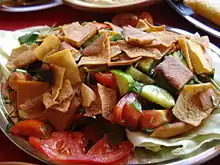 |
The Levant | A Levantine bread salad made from toasted or fried pieces of pita bread (khubz 'arabi) combined with mixed greens and other vegetables,[11] fattoush belongs to the family of dishes known as fattat (plural) or fatta, which use stale flatbread as a base.[11] |
| Fried mushrooms | .jpg.webp) |
Deep-fried mushrooms, they have been dipped in batter. In the United States and some other countries, they are often served as an appetizer or snack. | |
| Garlic knot |  |
A type of garlic bread appetizer, they are found in many pizzerias around the world. They are usually made with pizza dough, and garlic (or garlic powder). They can also be topped with Parmesan cheese, oregano, and/or parsley. | |
| Gravlax |  |
Nordic countries | Raw salmon, cured in salt, sugar, and dill, gravlax is usually served as an appetizer, sliced thinly and accompanied by hovmästarsås (literally "steward sauce", also known as gravlaxsås), a dill and mustard sauce, either on bread of some kind or with boiled potatoes. |
| Jalapeño popper |  |
United States | These are jalapeño peppers that have been hollowed out, stuffed with a mixture of cheese, spices, and sometimes ground meat. They are either breaded and deep-fried or wrapped in bacon, and baked or grilled. |
| Ketoprak | 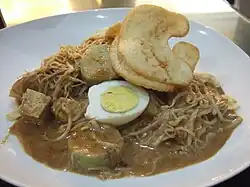 |
Indonesia | A vegetarian dish consisting of tofu, vegetables, rice cake, and rice vermicelli served in peanut sauce. |
| Kinilaw |  |
Philippines | A raw seafood dish and preparation method native to the Philippines, prepared using raw cubed fish mixed with vinegar (usually coconut vinegar or cane vinegar) as the primary denaturing agent; along with a souring agent to enhance the tartness like calamansi, dayap, biasong, kamias, tamarind, green mangoes, balimbing, and green sineguelas. It is flavored with salt and spices like black pepper, ginger, onions, and chili peppers (commonly siling labuyo or bird's eye chili). |
| Kuku Sabzi | .jpg.webp) |
Iran | Herb kuku, or kuku sabzi in Persian, is the most common type of kuku. It is made of eggs and herbs such as leeks and parsley. Garlic, which is especially popular in the northern regions of Iran, is also used as an ingredient. |
| Lumpia |  |
Philippines | Various types of spring rolls made of thin paper-like or crepe-like pastry skin called "lumpia wrapper" enveloping savory or sweet fillings. It is available in fried or unfried variants. |
| Malakoff[12] |  |
Switzerland (Romandy) | A fried ball of cheese. |
| Martabak |  |
Indonesia | A stuffed pancake or pan-fried bread. This appetizer is spicy folded omelette pancake with bits of vegetables, sometimes mixed with green onion and minced meat, made from pan fried crepes which is folded and cut to squares. |
| Matbucha |  |
Middle East, Arab culture | Tomatoes and roasted bell peppers seasoned with garlic and chili pepper,[13] the name of the dish originates from Arabic and means "cooked [salad]". It is served as an appetizer, often as part of a meze. |
| Meze |  |
Middle East, Balkans, Caucasus | In Levantine cuisines and in the Caucasus region, meze is served at the beginning of all large-scale meals,[14] |
| Mozzarella sticks | .jpg.webp) |
United States | Elongated pieces of battered or breaded mozzarella |
| Nachos |  |
Piedras Negras, Coahuila, Mexico | In their simplest form, nachos are tortilla chips (totopos) covered in nacho cheese or shredded cheese and/or salsa. |
| Obložené chlebíčky | 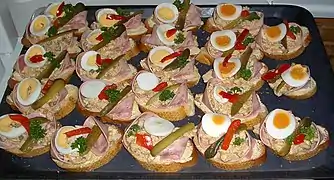 |
Czech Republic, Slovakia | A Czech and Slovak appetizer or snack, it consists of an open-faced sandwich topped with butter and a variety of other toppings, such as cured meats, fish, hard-boiled egg, and vegetables. |
| Onion ring |  |
United States | Generally, it consist of a cross-sectional "ring" of onion (the circular structure of which lends itself well to this method of preparation) dipped in batter or bread crumbs and then deep-fried; a variant is made with onion paste. |
| Samosa | 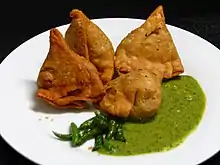 | Middle East, South Asia | This is a fried or baked pastry with a savory filling, such as spiced potatoes, onions, peas, lentils, ground lamb, ground beef, or ground chicken. The size, shape, and consistency may vary, but typically, they are distinctly triangular. Samosas are often accompanied by chutney.[15] They are a popular appetizer or snack in South Asia, Southeast Asia, Central Asia, Southwest Asia, the Arabian Peninsula, the Mediterranean, the Horn of Africa, North Africa, and South Africa. |
| Pakora | .jpg.webp) | India | It is created by taking one or two ingredients such as onion, eggplant, potato, spinach, plantain, paneer, cauliflower, tomato, chili pepper, or occasionally bread[16] or chicken and dipping them in a batter of gram flour and then deep-frying them. The most popular varieties are palak pakora, made from spinach, paneer pakora, made from paneer (soft cheese), pyaz pakora, made from onion, and aloo pakora, made from potato. |
| Haggis pakora |  |
Scotland | An Indo-Gael fusion food. Haggis (sheep's heart, liver and lungs, onion, oatmeal) is flavored with Indian spices, formed into balls, coated in a batter of gram flour, yogurt and spices, and deep-fried in the same manner as an Indian pakora. |
| Paneer tikka | 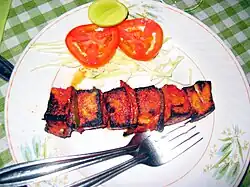 | India | Made from chunks of paneer marinated in spices and grilled in a tandoor,[17][18] it is a vegetarian alternative to chicken tikka and other meat dishes.[19][20][21] It is a popular dish that is widely available in India and other countries with an Indian diaspora.[22][23] |
| Panipuri |  | India | A popular street snack in India, Pakistan, Bangladesh, Sri Lanka, and Nepal, it consists of a round, hollow puri, fried crisp, and filled with a mixture of flavored water (pani), tamarind chutney), chili, chaat masala, potato, onion, and chickpeas. It is generally small enough to fit completely into one's mouth. It is a popular street food dish in Mumbai, Delhi, Karachi, Lahore, Dhaka, Kolkata, and Kathmandu. |
| Papadum | 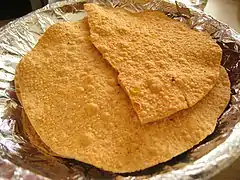 | India | A thin, crisp Indian preparation, it is sometimes described as a cracker. It is typically served as an accompaniment to a meal in India. It is also eaten as an appetizer or a snack and can be eaten with various toppings such as chopped onions, chutney, or other dips and condiments. |
| Chaat |  | India | Chaat is a term describing one of many types of savory snacks, typically served at road-side tracks from stalls or food carts in India.[24][25] |
| Papri chaat |  | India | A Pakistani and North Indian fast food, chaat, an Indo-Aryan word which literally means lick, is used to describe a range of snacks and fast food dishes; papri refers to crisp fried dough wafers made from refined white flour and oil. In papri chaat, the papris are served with boiled potatoes, boiled chick peas, chilis, yogurt, and tamarind chutney, and topped with chaat masala and sev. |
| Dahi puri | 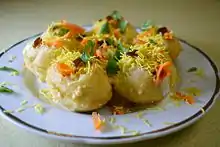 | India | An Indian snack which is especially popular in the state of Maharashtra, the dish is a form of chaat and originates from the city of Mumbai.[26] It is served with mini-puri shells (golgappa), which are more popularly recognized from the dish golgappay. Dahi puri and pani puri chaats are often sold by the same vendor. |
| Dahi vada | .JPG.webp) | India | An Indian chaat prepared by soaking vadas in thick dahi (yogurt). To add more flavor, they may be topped with coriander or mint leaves, chili powder, crushed black pepper, chaat masala, cumin, shredded coconut, green chilis, or boondi. |
| Serabi |  |
Indonesia | A traditional pancake that is made from rice flour with coconut milk or shredded coconut as an emulsifier. Most of traditional serabi tastes sweet, as the pancake is usually eaten with kinca or thick golden-brownish-colored coconut sugar syrup. |
| Perkedel |  |
Indonesia | Fried patties, made of ground potatoes, minced meat, peeled and ground corn or tofu, or minced fish. Most common perkedel are made from mashed potatoes. |
| Pigs in a blanket |  |
United States and Great Britain | A snack or hors d'oeuvre in a variety of countries consisting of a small sausage wrapped in pastry or bacon. |
| Picada |  |
Argentina | A serving of savory snack and finger foods, including cheeses, cured meats, fermented sausages, olives and peanuts.[27][28] |
| Pizzetta |  |
A miniature pizza, it is prepared in a similar fashion, but is only a few inches in diameter. | |
| Poke | 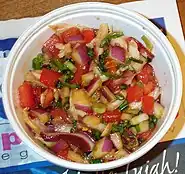 |
United States (Hawaii) | A raw salad served as an hors d'œuvre in Hawaiian cuisine. modern poke typically consists of cubed ʻahi (yellowfin tuna) sashimi marinated with sea salt, a small amount of soy sauce, inamona (roasted crushed candlenut), sesame oil, limu seaweed, and chopped chili pepper. |
| Potato skins |  |
United States | Slices of half-circular pieces of potatoes with the skin left on one side and a quarter-inch or so of the inside of the potato on the other, the potato side is covered with toppings such as bacon, cheddar cheese, green onions, and anything else that might be found on a baked potato. |
| Potato wedges |  |
Wedges of potatoes, often large and unpeeled, that are either baked or fried | |
| Prawn cocktail | 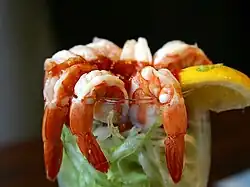 |
A seafood dish, it consists of "shelled prawns in mayonnaise and tomato dressing, served in a glass", also referred to as a shrimp cocktail.[29] | |
| Pu pu platter |  |
United States | An assortment of small meat and seafood appetizers, a typical pupu platter, as found in American Chinese cuisine, might include an egg roll, spare ribs, chicken wings, chicken fingers, beef teriyaki, skewered beef, fried wontons, crab rangoon, and fried shrimp, among other items, accompanied by a small hibachi grill. |
| Queso flameado |  |
Mexico, United States (Southwest) |
Its typical main ingredients are melted cheese and a characteristic meat sauce of loose fresh chorizo, tomato, onion, chili, and spices. |
| Rocky Mountain oysters |  |
North America | Bull calf testicles used for human consumption, it is a well-known novelty dish in parts of the American West and Western Canada where cattle ranching is prevalent and castration of young animals is common ("prairie oysters" is the preferred name in Canada, where they may be served in a demi-glace, not deep-fried).[30] In Oklahoma and the Texas Panhandle, they are sometimes called calf fries, but only if taken from very young animals.[31] |
| Rumaki |  |
mock-Polynesian | Water chestnuts and liver wrapped in bacon (or, as a substitute, either pastrami or cured salted beef [called "beef fry"]) and marinated in a flavored soy sauce[32] |
| Saganaki |  |
Greece | Various Greek dishes prepared in a small frying pan, itself called a saganaki, they are best-known as being an appetizer of fried cheese. |
| Sakinalu/chakli | 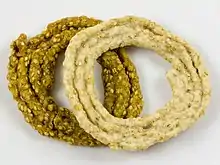 | India | A special type of snack, they are prepared in Maharashtra, Karnataka and Telangana, and parts of Guntur District, and are very popular in all districts of Telangana Region.[33][34] It is essentially made up of rice flour and with small amount of spices, sesame seeds, carom seeds (ajwain), and salt, prepared during Makar Sankranti festival by most people irrespective of caste and creed.[35] Sakinalu are also given to the groom's by the bride's parents for distributing among their relatives and friends.[36] |
| Salmon tartare | .jpg.webp) |
Prepared with fresh raw salmon and seasonings, it is commonly spread on a cracker or artisan-style bread and enjoyed as an appetizer. | |
| Stuffed mushrooms | 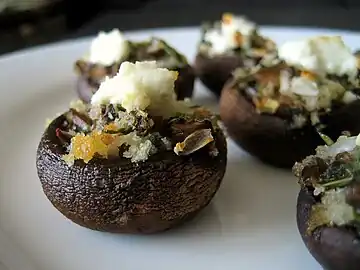 |
Mushrooms filled with a stuffing and baked or broiled | |
| Sushi[37][38][39][40] | 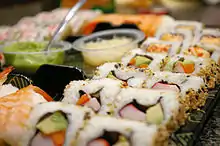 |
Japan | Cooked vinegar-flavored rice combined with other ingredients, the Oxford English Dictionary notes the earliest written mention of sushi in English in an 1893 book, A Japanese Interior, where it mentions sushi as "a roll of cold rice with fish, seaweed, or some other flavoring".[41][42] However, there is also mention of sushi in a Japanese-English dictionary from 1873,[43] and an 1879 article on Japanese cookery in the journal Notes and Queries.[44] |
| Tokwa’t baboy | 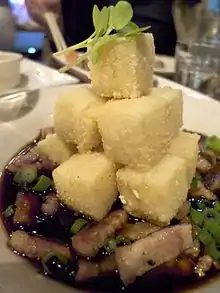 |
Philippines | A typical Philippine appetizer, it usually includes pork ears, pork belly, and deep-fried tofu, and is dipped in a mixture of soy sauce, pork broth, vinegar, chopped white onions, scallions, and red chili peppers. |
| Zakuski |  |
Russia | A Russian term for hors d'oeuvres, snacks, and appetizers, it is served before the main course. Usually presented buffet style, it often consists of cold cuts, cured fishes, mixed salads, kholodets, pirozhki, various pickled vegetables (such as tomatoes, beets, or cucumbers), sauerkraut, pickled mushrooms, deviled eggs, hard cheeses, caviar, canapés, open sandwiches, and breads. |
See also
- Amuse-bouche
- Banchan – Korean side dishes
- Cicchetti
- Dim sum
- Finger food
- Garnish
- Gujeolpan
- List of dips
- List of pastries
- Picada
- Short eats
- Preprandial – a term sometimes used to refer to hors d'oeuvre
- Smörgåsbord
References
- ↑ Horwitz, Jeremy (January 1, 2008). "Chicken Wings, or, Why People Know About Buffalo". Buffalo Chow.com. Archived from the original on December 31, 2009. Retrieved November 18, 2009.
- ↑ Alan Davidson, Tom Jaine, The Oxford companion to food, Oxford University Press, 2006, ISBN 0-19-280681-5, ISBN 978-0-19-280681-9, p. 150.
- ↑ Ellie Krieger (17 December 2014). "Crispy Chicken Fingers". foodnetwork.com. Retrieved 3 July 2015.
- ↑ "The History of Chicken Fingers". Leite's Culinaria. Retrieved 3 July 2015.
- ↑ Carpender, Dana (2005). 300 Low-Carb Slow Cooker Recipes: Healthy Dinners that are Ready When You Are. Beverly, MA: Fair Winds Press. p. 57. ISBN 978-1-59233-497-1.
- ↑ Haughton, Natalie (2005). 365 Easy One Dish Meals. New York: William Morrow Cookbooks (Harper Collins). pp. 213–214. ISBN 0-06-057888-2.
- ↑ Nunley, Debbie (2005). A Taste of Maryland History: A Guide to Historic Eateries and Their Recipes. Winston-Salem, NC: John F. Blair, Publisher. p. 125. ISBN 978-0-89587-313-2.
- ↑ Jessica (2012-12-05). "What Are The Crudités?". Frenchvegetables.com. Archived from the original on 2013-01-23. Retrieved 2013-04-04.
- ↑ Robert A. Palmatier, "Food: a dictionary of literal & nonliteral terms" Westport: Greenwood Press, 2000. p. 96
- ↑ "How to make the best devils on horseback". Metro.co.uk. 19 December 2012. Retrieved 19 December 2012.
- 1 2 Wright, 2003, p. 241
- ↑ Beard, J. (2015). The New James Beard. Open Road Media. p. pt301. ISBN 978-1-5040-0457-2.
- ↑ "Page Not Found". www.jewishvirtuallibrary.org. Retrieved 2 May 2017.
{{cite web}}: Cite uses generic title (help) - ↑ Alan Davidson, The Oxford Companion to Food, Oxford University Press, 1999, pp. 500-501
- ↑ Arnold P. Kaminsky; Roger D. Long (23 September 2011). India Today: An Encyclopedia of Life in the Republic. ABC-CLIO. p. 151. ISBN 978-0-313-37462-3. Retrieved 22 April 2012.
- ↑ Arora, Ritu (2002). Healthy Kitchen: More Than 350 Oil Free Recipes. New Delhi, India: B. Jain publishers (P) Ltd. pp. 186, Bread Pakora. ISBN 81-8056-208-5.
- ↑ Dalal, Tarla (2007). Punjabi Khana. Sanjay & Co. p. 29. ISBN 978-8189491543.
- ↑ "Fine dining on Nizami fare". The Hindu. 9 November 2011. Archived from the original on 22 April 2012. Retrieved 20 March 2012.
- ↑ "Paneer tikka & kali dal at Kwality". Daily News and Analysis. 9 August 2008. Retrieved 20 March 2012.
- ↑ Kapoor, Sanjeev (2010). Paneer. Popular Prakashan. p. 3. ISBN 978-8179913307.
- ↑ "Paneer platter". The Hindu. 26 May 2007. Archived from the original on 1 October 2008. Retrieved 20 March 2012.
- ↑ "A new avatar". The Telegraph. 2 August 2009. Archived from the original on August 7, 2009. Retrieved 21 March 2012.
- ↑ "In US, Indian cuisines sell like hot curry!". The Economic Times. 20 December 2006. Retrieved 21 March 2012.
- ↑ Thumma, Sanjay. "CHAAT RECIPES". Hyderabad, India: Vahrehvah.com. Archived from the original on 2012-11-03. Retrieved 2012-11-27.
- ↑ The Chaat Business (in Bengali)
- ↑ "Mouthful of joy". The Hindu. 2004-02-11. Archived from the original on 15 March 2004. Retrieved 3 July 2015.
- ↑ Manzoni, Carlos (May 20, 2012). "La picada en la Argentina es más nacional que nunca". La Nación (in Spanish). Retrieved June 3, 2021.
- ↑ Serrano, Larisa (April 9, 2021). "Picadas. El ABC para que salga perfecta como entrada o plato principal". La Nación (in Spanish). Retrieved June 3, 2021.
- ↑ Karan Raj (2002). Modern Dictionary Of Tourism. Sarup & Sons. ISBN 978-81-7890-058-2.
- ↑ "Testicle Festival in Calgary, Alberta". Metacafe. Retrieved 3 July 2015.
- ↑ "Rocky Mountain Oysters: Expanding on the List of Organ Meats - The Weston A. Price Foundation". westonaprice.org.
- ↑ Heyhoe, Kate (2007). Great Bar Food at Home. Hoboken, New Jersey: John Wiley & Sons. p. 34. ISBN 978-0-471-78183-7.
- ↑ "Students celebrate 'Sankranti Sambaralu'". The Hindu. 2011-01-01. Archived from the original on 3 January 2014. Retrieved 9 February 2012.
- ↑ "BJP women add festive flavour to protest". The Hindu. 2011-01-14. Archived from the original on 21 September 2011. Retrieved 9 February 2012.
- ↑ "Telangana supporters stage 'rasta rokos'". The Hindu. Retrieved 9 February 2012.
- ↑ "Trailing the Andhra food route". Times of India. Retrieved 9 February 2012.
- ↑ Issenberg, Sasha (3 May 2007). The Sushi Economy. ISBN 9781101216880. Retrieved 3 July 2015.
- ↑ Japanese Cooking – Shizuo Tsuji – Google Books p. 293.
- ↑ Strada, Judi; Moreno, Mineko Takane (31 March 2011). Sushi For Dummies. ISBN 9781118053379. Retrieved 3 July 2015.
- ↑ Sushi – Google Books p. 5.
- ↑ "Sushi", Oxford English Dictionary, Second edition, 1989; online version December 2011. Accessed 23 December 2011.
- ↑ Bacon, Alice Mabel (1893). A Japanese interior. Houghton, Mifflin and Company. p. 271.
p.271: Sushi, a roll of cold rice with fish, sea-weed, or some other flavoring
p.181: While we were waiting for my lord and my lady to appear, domestics served us with tea and sushi or rice sandwiches, and the year-old baby was brought in and exhibited.
p.180: All the sushi that I had been unable to eat were sent out to my kuruma, neatly done up in white paper. - ↑ James Curtis Hepburn, Japanese-English and English-Japanese dictionary, Publisher: Randolph, 1873, 536 pages (page 262)
- ↑ W.H. Patterson, "Japanese Cookery", Notes and queries, Publisher: Oxford University Press, 1879. (p.263)
External links
 Media related to hors d'oeuvre at Wikimedia Commons
Media related to hors d'oeuvre at Wikimedia Commons